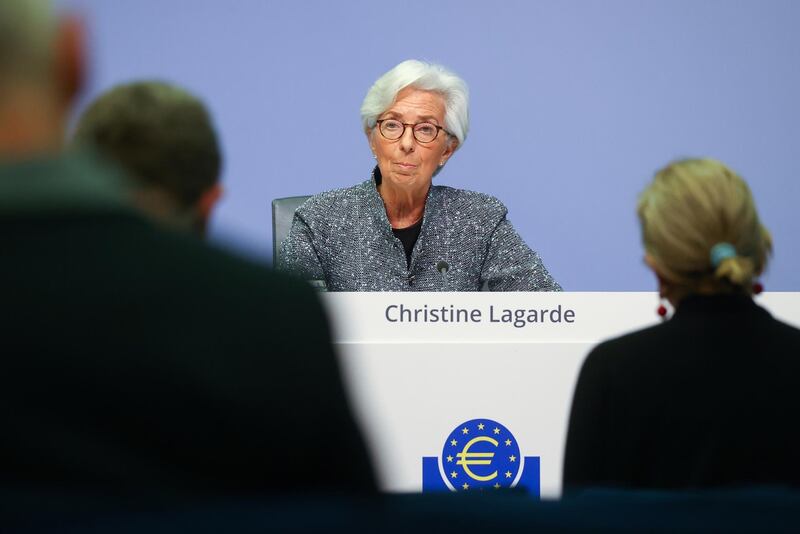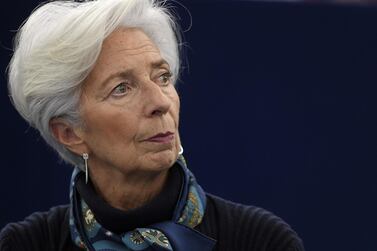The European Central Bank approved fresh stimulus measures on Thursday to help the ailing euro zone economy cope with the shock of the coronavirus pandemic but unexpectedly kept interest rates on hold, a decision that may dismay markets.
With millions of people in lockdown, financial markets in freefall and companies struggling with disrupted supply chains, the ECB said it would give businesses more ultra-cheap loans, raise asset purchases and provide banks with capital relief to cope with the downturn.
"These operations will support bank lending to those affected most by the spread of the coronavirus, in particular small and medium-sized enterprises," the ECB said in a statement.
"A temporary envelope of additional net asset purchases of €120 billion (Dh494.7bn) will be added until the end of the year, ensuring a strong contribution from the private sector purchase programmes."
Its move follows emergency rate cuts by the US Federal Reserve and the Bank of England, highlighting fears among policymakers that the epidemic could push the global economy into recession and threaten the sort of disruption last seen in the 2008 global financial crisis.
The ECB said it would offer a previous longer-term refinancing operation at a rate as cheap as minus 0.75 per cent and conduct additional longer-term refinancing operations to provide immediate liquidity support to the euro area financial system.
But the deposit rate will stay unchanged at a record low minus 0.5 per cent, suggesting policymakers believe it may already be near the so-called reversal rate, where further cuts are counterproductive because they hurt bank margins to the point of thwarting lending.
The euro zone's central bank kept the door open to further rate cuts, keeping its interest rate guidance unchanged.
In addition to the ECB's moves, its separate bank supervision arm said it would offer lenders temporary capital and operational relief in reaction to coronavirus.
Bank can fully use capital and liquidity buffers, including Pillar 2 Guidance and will benefit from relief in the composition of capital for Pillar 2 Requirements, the supervisor said.
The ECB's move comes a day after the World Health Organisation called the coronavirus a pandemic for the first time, saying other countries would soon join Italy and Iran on the frontline of the disease.
President Donald Trump meanwhile imposed restrictions for one month on travel to the US from 26 European countries.
While policymakers insist the financial sector is sound and there will not be a repeat of the 2008 crisis, European stocks have dropped 28 per cent in the past few weeks with banks taking an even bigger hit of 35 per cent.
German bond yields have meanwhile tumbled to minus 0.80 per cent as investors seek safety, piling pressure on the ECB to cut rates even further.
Ms Lagarde, who has encouraged ECB staff to work from home if they wish to, has repeatedly told governments to act quickly on the virus because passivity could lead to calamity on a par with the global financial crisis.
"In light of rapid developments, working on responses on all fronts to tackle #coronavirus impact," European Commission chief Ursula von der Leyen said in a tweet on Thursday.
"Assessment with scientists, coordination of health and border measures, provision of protective equipment, package to prop up the EU economy."
Many economists expect Germany, Europe's economic powerhouse, to be in recession in the first half of this year and some predict a similar outturn for the entire bloc.
While the ECB's stimulus suggests it is keen to help, it has already used up its most powerful weapons in nearly a decade of stimulus. Interest rates are at record lows, it has gobbled up €2.6 trillion ($2.94 tn) of mostly government debt, and has for years offered essentially free cash to banks to keep them lending.
Low rates may also be sowing the seeds of the next crisis as they compress bank margins and fuelling housing bubbles.
Compounding the ECB's headache, oil prices have crashed, a double-edged sword for rate-setters.
While lower crude prices boost growth and consumer purchasing power through lower fuel prices, they also drag inflation sharply lower - a problem as the ECB has undershot its target of almost 2 per cent since 2013.
Some economists expect inflation to fall to zero this spring if crude prices stay at current levels, raising fears of a damaging deflation spiral.
The ECB will also release economic forecasts on Thursday as it does every three months, though the cut-off date for their underlying assumptions was before the worst of the market turmoil and the oil price crash.







